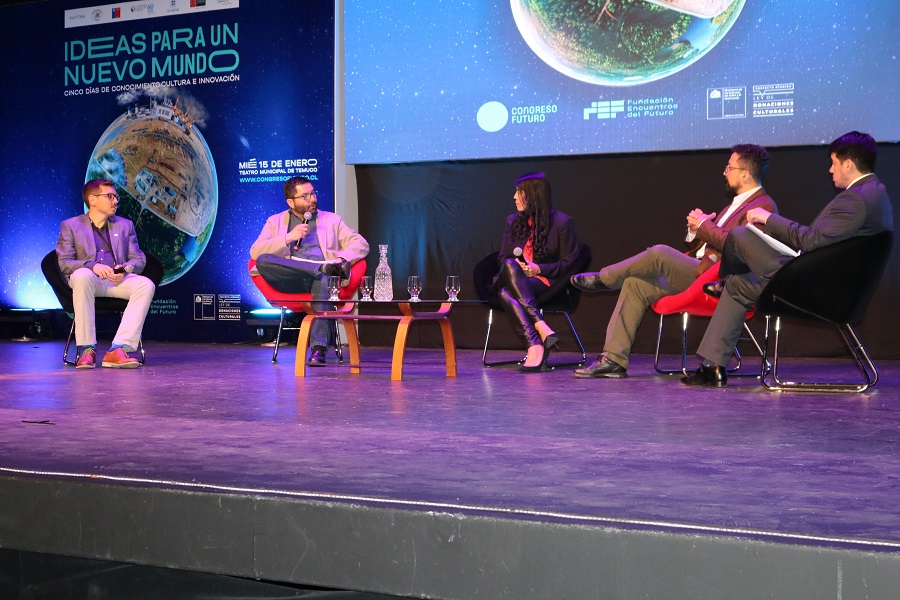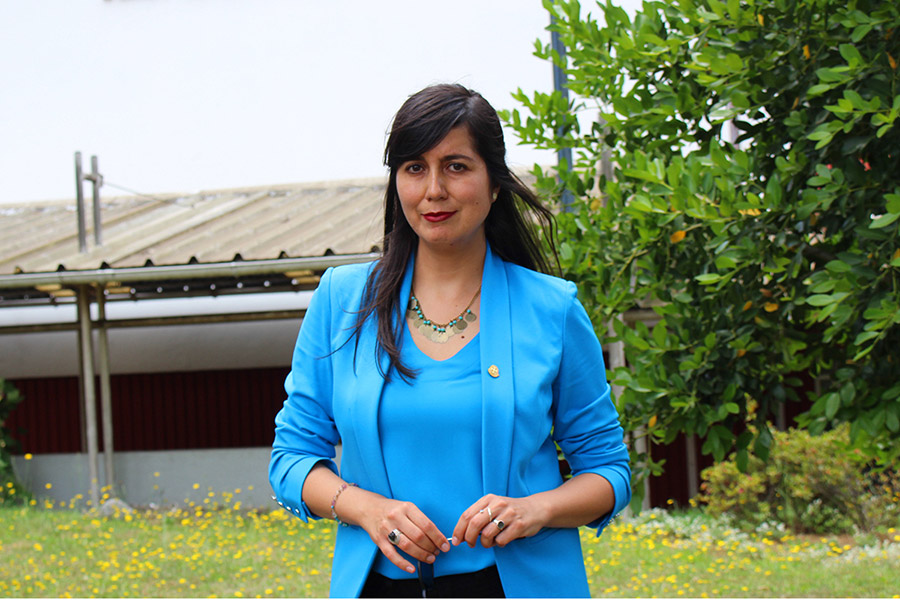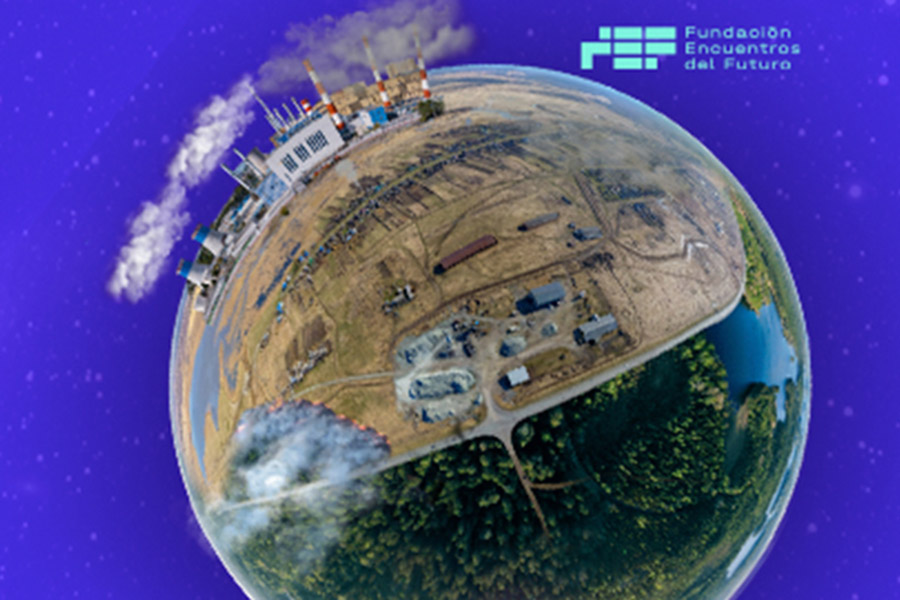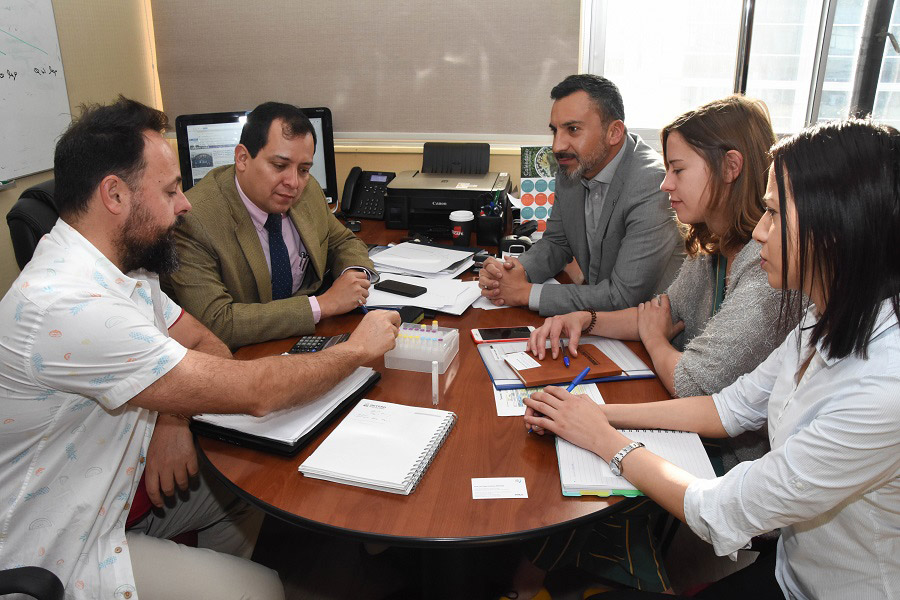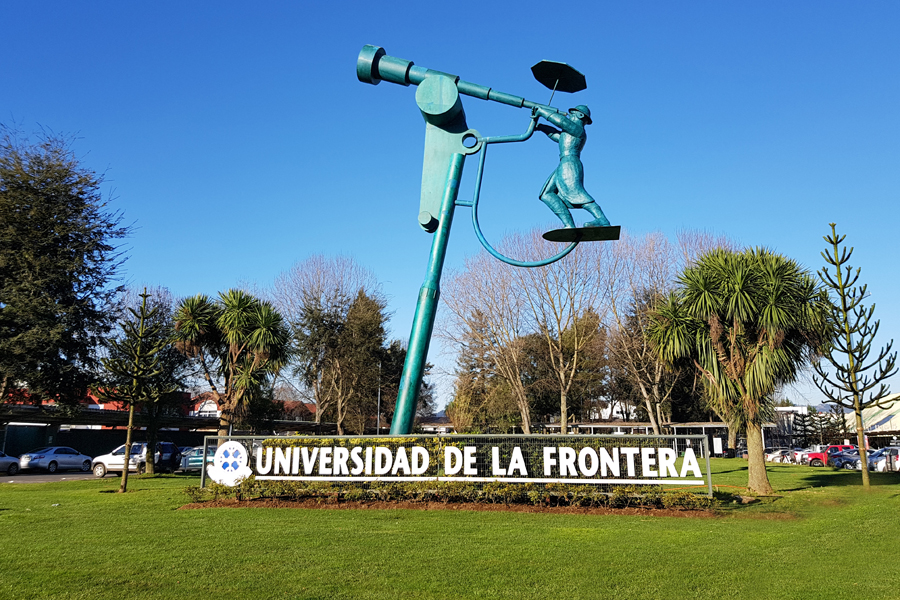|
This event for science dissemination took place in cooperation with the regional Intendancy of the Araucanía Region and the Universities Católica de Temuco, Autónoma de Chile and Universidad de La Frontera. |
Neuroscience, Bioart and public participation were the main topics of this year’s version of the Congress of the Future Araucanía 2020 (“Congreso Futuro Araucanía 2020”), which brought outstanding national and international experts together in Temuco, Chile. The congress was led by the Committee for Challenges of the Future, Science, Technology and Innovation of the Senate and the Foundation Encounters for Future and organized in our region by the regional Intendancy of the Araucanía Region and the Universities Universidad Católica de Temuco, Universidad Autónoma de Chile and Universidad de La Frontera (UFRO). The event for debate and an exchange of ideas regarding the necessity of more and improved science and technology took place at the Municipal Theatre in Temuco, allowing the civil society to think about the impact current scientific, social and cultural progress has on our daily life. “Science and Arts”, “Neurobiology and Mental Health”, and “Democracy and Participation” were the main topics addressed in three different panels, which were led by an international expert, academic staff members and researchers of the three universities that participated in the organization of the congress in the Araucanía Region. “Public participation and neuroscience are two very important topics in our region and the country. And the fact to have someone from outside sharing his opinion and knowledge on the social changes we are living, is very enriching for all of us, because it helps us to learn from and deal with the changes as a society in the future,” Dr. Renato Hunter, the Vice-rector for Research and Graduate Studies at UFRO, pointed out. “We are very happy about the partnership between these three universities and the Intendancy. The interest and number of participants was very high and we think that the addressed issues are contemporary and of high importance, contributing to the discussion and allowing to deal with interesting topics for our regional development”, said Paola Olave, the director of the UFRO Office for Outreach and Community Engagement. EXPERTS Since its first version, the Congress of the Future brought outstanding national and international thinkers, scientists and researchers together and invited the civil society to think about the future of our civilization and the impact current scientific, social and cultural progress has on our daily life. This year, three speakers participated in the congress in the Araucanía Region: John Cryan, PhD. in pharmacology, professor and chair of the Department of Anatomy and Neuroscience at University College Cork, Ireland; Joaquín Fargas, an industrial engineer, art director of the Bioart Laboratory and professor of technological art at Maimónides University in Buenos Aires, Argentina; and Ximena Hartsock, a graduate in Middle Eastern and Islamic studies, and president and co-founder of Phone2Action. The Universidad de La Frontera participated with experts in each of the three panels: Patricia Muñoz, the director of the UFRO undergraduate program in Electronic Engineering, who has a Master’s Degree in Sciences and Engineering with specialization in Electrical Engineering; Dr. Cristian Paz, a researcher of the Department of Basic Sciences and an academic staff member of the Doctoral Program in Science with specialization in Applied Cellular and Molecular Biology; and Dr. Mauricio García, an academic staff member of the Department of Social Science and of the Master’s Program in Regional, Local and Human Development of IDER-UFRO. “It is very interesting for me to address and discuss the relation between intestinal flora and neural realities, in other words: behavior, moods, etc. It would be great if this kind of events could be organized more often in order to reach the entire community, since this is not only a scientific discussion, but also a way of dissemination”, Dr. Cristian Paz pointed out.
Written by: UFRO Communications Office
|
|
Dr. Carolina Navarrete was awarded with the Scholarship “Chile Crea” of the Ministry of Culture, Arts and Heritage, which will allow her to realize a research stay at Wellesley College in Massachusetts, USA. |
The academic staff member of the Department of Languages, Literature and Communication of the Universidad de La Frontera (UFRO), Dr. Carolina Navarrete, has been awarded with the Scholarship Chile Crea, thanks to her research project called “Promotion of women’s readings and writings, with an emphasis on human rights, social justice and memory”, which is financed by the Ministry of Culture, Arts and Heritage through the Undersecretary for Culture and Arts of the Chilean Government. This scholarship provides a research stay at the Spanish Department of Wellesley College, which is a private women’s college in the state of Massachusetts in the USA, where Dr. Navarrete is going to work together with the prestigious US-Chilean writer and academic staff member Dr. Marjorie Agosín, who is a human rights activist that has been awarded with the Human Rights Leadership Award by the United Nations and with the Gabriela Mistral Award by the Chilean Government. She is the author of more than eighty books that have been published by the world’s leading publishing houses. Her work includes narratives, poetry, theatre and memories. The research stay of Dr. Navarrete is also part of the Fondecyt Project she is leading, called “Stitching loose pieces of oneself together: towards poetics of details in the writings of the I of contemporary female authors (1990-2018)” (Fondecyt Project No. 11190799). This opportunity of professional development at Wellesley College will allow Dr. Navarrete during the month of September of this year to study in depth the work of an internationally awarded author for her literary work in defense of the human rights of groups of women that have been refugees and excluded by the political, economic and social systems. Dr. Navarrete appreciates the opportunity this scholarship offers and pointed out: “I am very grateful for this opportunity, since it allows me to specialize in the field of research I have been developing over the years, such as the study of women’s writings. I am interested in revealing the role of female writers, especially because of the little knowledge that exists about the work produced by women in the Chilean educational context. In this context, this scholarship stands for a concrete opportunity to motivate people to get to know and to read the work of this prolific writer, and of other female writers who are writing about contemporary and relevant issues in today’s world.” Wellesley College is a private women’s college in the USA that started in 1875. It was founded by Henry Fowle Durant and his wife Pauline Fowle Durant and its mission is to “provide an excellent liberal arts education for women who will make a difference in the world”. Written by: Faculty of Education, Social Science and Humanities |
|
The event will take place on January 15 at the Municipal Theatre of Temuco, with the support of the regional Intendancy of the La Araucanía Region and the Universities Católica de Temuco, Autónoma de Chile and Universidad de La Frontera. |
This year’s version of the Congress of the Future (“Congreso Futuro Araucanía 2020”) in the La Araucanía Region is going to take place under the title “Ideas for a new world” and is one of the biggest events for knowledge, science and art in South America. The initiative is led by the Committee for Challenges of the Future, Science, Technology and Innovation of the Senate and the Foundation Encounters for Future. It is the ninth version of the congress held from January 13 to 17. In the La Araucanía Region the event takes place at the Municipal Theatre of Temuco on January 15. The Congress is supported and coordinated by the regional Intendancy of the La Araucanía Region and the Universities Universidad Católica de Temuco, Universidad Autónoma de Chile and Universidad de La Frontera and provides a space for debate on the urgent necessity of more and improved science, technology and ideas in Chile that allow us to create the country we want to live in. Since its first version, the Congress of the Future brought outstanding national and international thinkers, scientists and researchers together and invites the civil society to think about the future of our civilization and the impact current scientific, social and cultural progress has our daily life. “This is a great opportunity for La Araucanía and in this regard this congress will allow us to have a valuable space to scientifically rethink our region and to visualize the way we can contribute with our knowledge and our researchers and scientists to the concrete development of our region in different areas, such as agriculture, fruit growing, biomedical sciences, social science, etc.”, Dr. Eduardo Hebel, the rector of UFRO, explained. The university authority appreciates the joint work of the three participating universities in the region and pointed out that, this way, the potential of science will get reflected in the development of each of the questions asked in the different fields that will be discussed, such as renewable energies and water shortage, amongst others. “I want to thank the three rectors for their participation in this important event. The commitment of our universities is extremely important for the regional development. This is an historic opportunity to show the potential of our region to the country and the world, that we are full of opportunities,” Victor Manoli, the regional intendant of La Araucanía, pointed out. INTERNATIONAL EXPERTS It is the third time that the La Araucanía Region is part of the event. This year, three speakers are going to participate. One of them is John Cryan, PhD. in pharmacology and professor and chair of the Department of Anatomy and Neuroscience at University College Cork, Ireland, where he works as a researcher at the Alimentary Pharmabiotic Centre’s Microbiome Institute. Another speaker is Joaquín Fargas, an industrial engineer, art director of the Bioart Laboratory and professor of technological art at Maimónides University in Buenos Aires, Argentina. And the third speaker is Ximena Hartsock, graduate in Middle Eastern and Islamic studies, and president and co-founder of Phone2Action. The constant growth of the Congress of the Future and the series of meetings with citizens that are taking place are possible thanks to a decision the Chilean Congress made in 2010 – within the bicentenary of the country’s independence – in order to connect the society with the challenges of the 21st century and, this way, to contribute to the democratization of the scopes and problems it would bring. The attendance at the congress is free of charge and you can pre-register under the following link: http://congresodelfuturo.cl/araucania/ and VIEW THE PROGRAM HERE.
Written by: UFRO Communications Office
|
|
This project is financed by the European Union and will allow to improve the precision in the assessment of risk and early detection of gallbladder cancer. |
“Gallbladder cancer is the second cause of death in Chilean women and the regions Los Ríos and La Araucanía are the ones with the highest prevalence in Chile,” said the physician Héctor Losada, who is a researcher who leads a project at the Universidad de La Frontera (UFRO) that will create a consortium for European-Latin American research for the eradication of this disease. This mega project is financed by the Program Horizon 2020 of the European Union and is led by Heidelberg University in Germany, together with the Universidad de La Frontera and counts with the participation of 12 research centers in Europe and Latin America, with the objective of improving the precision of risk assessment and early detection of this kind of cancer, identifying and considering geographic, environmental, lifestyle, ethnic, gender and molecular differences adequately. Dr. Justo Bermejo, the leader of the Group for Genetic Statistics of the Faculty of Medicine of Heidelberg University, affirmed that gallbladder cancer is not easy to detect. “The proof is that each year, 1,100 Chilean women and 500 men die from this disease. At present, a measure of prevention is to remove the gallbladder, but the objective of this project is to refine this preventive strategy, to identify biomarkers in the blood, which, at the same time, allow to identify individuals at high risk of developing gallbladder cancer,” he explains. The specialist pointed out that it has been shown that genetic ancestry is an important factor in order to detect gallbladder cancer potential. “The Chilean People are a mix of Europeans, Mapuche people and Aymara people. We already found out that Mapuche descendants have an increased risk of developing this disease.” The UFRO researcher Héctor Losada added: “The project functionally identifies, validates and characterizes new cancer biomarkers, developing a multifactorial risk score that integrates and establishes epidemical and molecular risk elements that have recently been identified. This way, the existing epidemiologic data can be exploited.” The generated information will allow to identify individuals at high risk, and can guide them through processes of monitoring and individual decision-making regarding the possible preventive gallbladder removal in regions of low and high cancer prevalence. This will also be the first step for the implementation of future clinical trials. INTERNATIONALIZATION OF UFRO RESEARCH The Director of Innovation at UFRO, Franklin Valdebenito Godoy, pointed out that the internationalization of research capacities is key nowadays, especially in fields of high impact within the global population. “We are creating links with research centers that are international benchmarkers, what has been a priority axis in innovation at UFRO. Through the Program “Connecting”, we were able to become a leader regarding the number of important projects awarded, for example by Horizon 2020, thanks to the capabilities and skills of our team and researchers.” It is worth mentioning that the Universidad de La Frontera has extensive experience in research on gallbladder cancer, which can mainly be found in patients aged 35-40.
Written by: Francisca Collao Kehr
UFRO Office of Innovation |
|
At the Universidad de La Frontera the year 2019 was marked by high scientific productivity and an increase in the number of awarded projects financed by external funds. The UFRO is recognized as one of the best complex universities in Chile. |
It was a year of excellent results. 2019 culminates for the Universidad de La Frontera (UFRO) with 13 Regular Fondecyt (Chilean National Fund for Scientific and Technological Development) and 16 Postdoctoral Fondecyt Projects awarded. Among the regional public and state universities, this is a privileged position with important achievements that turn the UFRO into one of the most prestigious complex universities in Chile. For the Vice-rector for Research and Graduate Studies, Dr. Renato Hunter Alarcón, this result is one of the products of the commitment and dedication of the academics of this educational institution and the actions implemented during the last year in order to progress in terms of scientific productivity and awarded projects with priority research lines for the Araucanía Region and Chile. “We achieved to improve our indicators of scientific productivity and the number of awarded projects compared to 2018, what makes us proud and puts us into an excellent position among Chilean research universities. Thanks to the hard work and dedication of our researchers and academic staff, we are one of the regional universities with most awarded Fondecyt Projects,” said the university authority and added that the year 2019 culminated for the UFRO as a solid year regarding research and graduate studies, “taking into account that we also achieved to accredit 100% of our doctoral programs.” The research director, Dr. César Arriagada Escamilla, takes this achievement as a motivation to keep improving in 2020. “We will stay on our path and keep trying to increase the number of awarded projects. In this case the number of awarded Regular Fondecyt projects increased from 12 to 13 and the number of Postdoctoral Fondecyt projects increased from 5 to 16 awarded projects this year.” Besides, this year the number of ISI-WoS publications reached an historical number of 550 publications during 2019. The university authorities complimented the researchers and academic staff who made this important result possible. The winners in the Regular Fondecyt project competition are the doctors León Bravo Ramírez, Marcela Calabi Floody, Ángel Carocca Becerra, Paula Cartes Indo, Mara Cea Lemus, Paola Durán Cuevas, Ricardo Felmer Dorner, Germán Gálvez García, Milko Jorquera Tapia, Pamela Leal Rojas, Pablo Meza Narváez, Mónica Rubilar Díaz, and Carolina Shene de Vidts. The winners in the Postdoctoral Fondecyt project competition are the doctors Daniel Basualto Alarcón, Fernanda Cid Alda, Hannah Demond, Fabián Dietrich, Jorge González Villagra, Héctor Herrera Echeverría, Montserrat Hevia Hoffmann, Ignacio Jofré Fernandez, Emilio Navarrete Sanhueza, Javiera Parada Cárcamo, Sofía Pontigo Seguel, Krishnendu Pramanik, Marcela Quilaqueo Gutiérrez, Carlos Reyes Velásquez, Alejandro Salinas Vaccaro, and Rubén Sánchez Sabate. Written by: Vice-rectorate for Research and Graduate Studies
|





